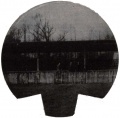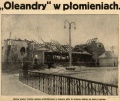Dzieje stadionu (English)
Z Historia Wisły
Lack of appropriate facilities is an obvious handicap in the functioning of any sports club. It's no wonder that shortly after forming the team, Wisła took on efforts to acquire a piece of land for the pitch and stadium. At the initial phase Wisła played in Jordan's Park (public playground at that time at the outskirts of Krakow) or on Błonia (vast meadow next to Jordan's Park). With the growing popularity of football and rapid development of the sport, these makeshift pitches became insufficient.
The first attempt at building own facilities concerned an ice rink. The idea was simple: income generated by the ice rink would be used to pay for its cost, with the surplus devoted to future creation of football stadium. The unfortunate part was that the winter of 1909 was very mild. As Wisła described it many years later: We have no luck with our own nest. We wandered around the corners of various "trash" places, and when moments came that seemed like finally fate was starting to smile upon us and the possibility of obtaining our own facilities was approaching, unexpected catastrophes cut off our existence. That's how it was in 1909 when leasing the ice rink brought us a huge shortfall because, due to an exceptionally mild winter in Krakow that year, we didn't open the skating track for a single day (then we had to spend years repaying a high loan we took).
Oleandry Sports Park
Several years after the unlucky attempt at creating an ice rink, Wisła - now formally registered as a Sports Society - was granted another piece of land on lease. The efforts of - among others - president Marian Orzelski and board members Zdzisław Kiliński and Adam Obrubański were instrumental in this endeavour. Not far from the first unsuccessful investment, on the so called exhibition grounds (Exhibition of Architecture and Interiors in Garden Surroundings) in Oleandry, the first football facility of Wisła was built. A majority of members of the Wisła Sports Society were involved in the construction works, including the football players. The opening ceremony of the field took place on April 5, 1914. Wisła defeated Czarni from Lviv 3-2 in the inauguration of the new field. As reported by the Illustrated Sports Weekly, "The field itself, as well as the stands, do not look too impressive. The field still requires a lot of work to bring it to the proper value for football competitions. It is also not advantageous to have stands from which the entire field cannot be seen. More space should be left around the field because such narrowing hinders the game." (ITS, April 11, 1914)
Despite these inconveniences, after so many years, the stadium undoubtedly filled Wisła members and supporters with pride. It is also worth noting the rich facilities of the stadium, based on the remains of the Exhibition of Architecture, giving the Park Sportowy in Oleandry the character of a multi-functional facility. In a short time, various events were organized here, including festivities on the occasion of the May 3rd holiday, balloon flights, and art exhibitions. The park also had a theater hall and a concert shell. This made Oleandry have the potential to become an important place on the sports and cultural map of rapidly developing city of Kraków.
However, the players and fans enjoyed their own headquarters briefly. The outbreak of World War I thwarted the opportunity to expand the Oleandry Sports Park of Wisła. Józef Piłsudski's units were stationed in Oleandry with the club's authorities' permission. It was here that the First Cadre Company, the nucleus of the later Polish Legions, was formed. On August 6, 1914, the First Cadre Company marched off to the battlefield from here. When Piłsudski's Legions left Oleandry and Wisła suspended its activities, the stadium was taken over by the city of Kraków, which converted it into cow enclosures. A year later, in March 1915, due to oversight and negligence, the stadium was completely burned down. After the war, only ruins remained of the Oleandry Sports Park and Wisła had start everything from scratch.






















